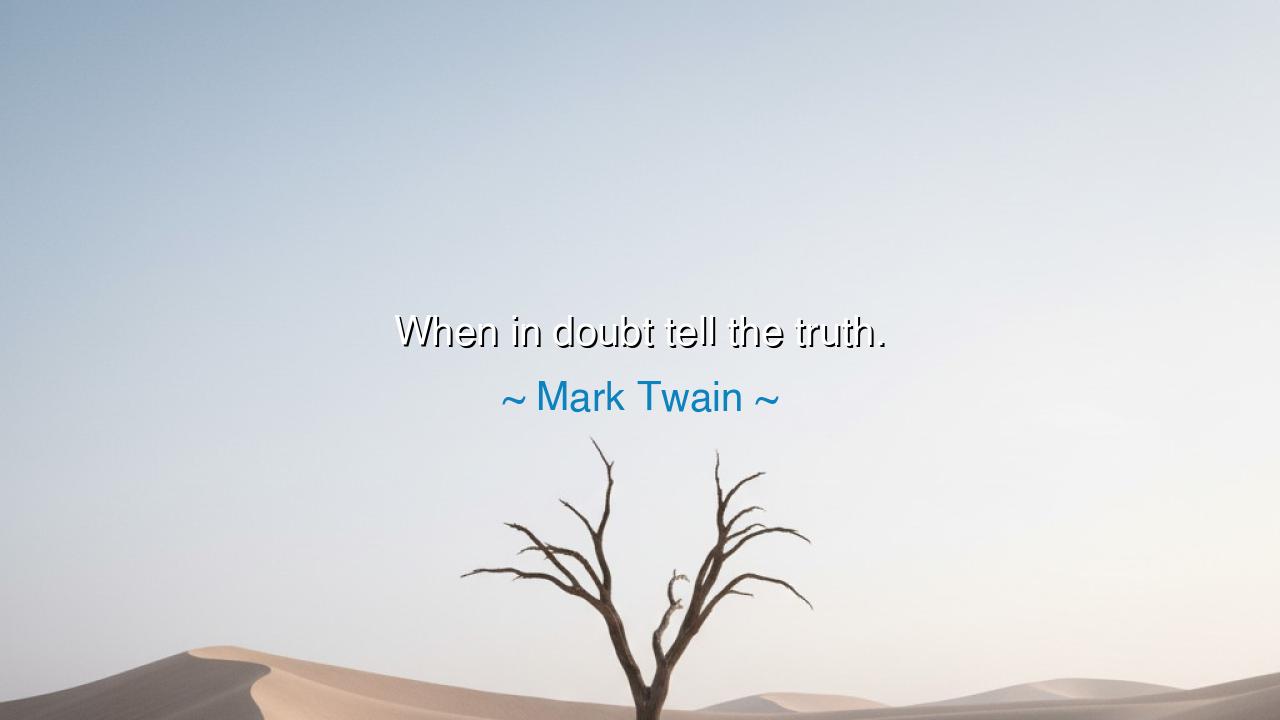
When in doubt tell the truth.






"When in doubt tell the truth." — so counseled Mark Twain, the great humorist and sharp-eyed observer of human folly. His words, though light in form, carry the weight of deep wisdom. Twain knew that life often entangles us in webs of uncertainty, where lies seem easy, deceptions seem convenient, and silence seems safe. Yet he proclaimed that in the very moment of doubt, when the heart trembles and the mind hesitates, the surest path is the path of truth. For lies require invention, memory, and endless maintenance, while truth stands firm, simple, and self-sustaining.
To understand Twain’s wisdom, one must see how he wielded humor as a weapon for honesty. He lived in an age of corruption, inequality, and shifting morals. He watched men tell lies to protect power, to maintain appearances, and to escape consequence. Yet Twain knew that deception, no matter how clever, is fragile. A single crack can expose the falsehood, while truth, however painful, needs no defense. Thus his advice: tell the truth, not as the last resort, but as the first shield.
History offers luminous examples of this principle. Consider George Washington, who as a young boy was confronted with the tale of the cherry tree. Whether legend or fact, the story lives because it captures a truth: he confessed, "I cannot tell a lie." That confession, far from weakening him, became the foundation of trust in his character. The truth may have brought momentary punishment, but it built a life of integrity. Washington’s strength as a leader came not from deception, but from the solid ground of honesty.
Or reflect upon the fall of Richard Nixon. Here was a man who, when in doubt, chose deception. Lies multiplied, cover-ups expanded, and memory tangled. In the end, it was not the act itself but the lie that destroyed him. The lesson resounds: when in doubt, those who tell lies weave ropes that will one day bind them. Those who tell truth, though it may sting, walk free. Twain, with his piercing wit, gave us a timeless compass to escape such ruin.
There is also a deeper dimension to Twain’s counsel. To "tell the truth" is not only to avoid falsehood, but to live authentically. It is to let words align with the heart, to allow the face to mirror the soul. For doubt comes when we are tempted to betray ourselves, when we fear consequence more than dishonor. But truth liberates. It frees the tongue, clears the conscience, and builds bonds of trust with others. Truth may not always please, but it always purifies.
The lesson for us, O seeker, is this: let truth be your default, especially in uncertainty. When fear whispers that a lie is safer, remember Twain’s wisdom: the lie may protect you for a day, but it will haunt you for years. The truth may wound for a moment, but it heals in time. Even in the smallest matters, truth fortifies the soul; in the greatest matters, it builds a legacy.
Practical action is within reach. In your daily dealings, resist the temptation to shade, to excuse, to invent. When uncertain, speak plainly, or if words may wound unnecessarily, hold silence rather than deceit. Teach children that truth is not weakness but courage. Build trust by making honesty your habit, so that others may rest upon your word as upon rock. In this way, you honor Twain’s wisdom and live a life untangled by deception.
Thus, Twain’s words endure: “When in doubt tell the truth.” Simple, direct, almost humorous in their brevity, yet they contain the marrow of wisdom. Truth requires no memory, no schemes, no disguises. It stands alone, and it endures. In a world that tempts us with falsehood, let us return always to this compass — and we shall find that doubt vanishes where truth is spoken.






UGUser Google
Mark Twain’s words sound so wise, but I wonder if there are times when telling the truth isn't the best course of action. Can the truth ever be a burden to someone else, especially in delicate or sensitive situations? How do we ensure that when we do tell the truth, it’s in a way that’s constructive, not destructive? It feels like there's an art to honesty that goes beyond just speaking plainly.
VVMD
I love this quote because it reminds me of the clarity that comes with honesty. But is it always that simple? In real life, situations can get complicated, and sometimes telling the truth isn’t as straightforward as it sounds. Could it ever be that, in some cases, we’re better off staying quiet or offering partial truths? How do we navigate the gray areas where truth can be difficult to discern?
BTNguyen Phan Bao Tram
I really resonate with this quote, but it makes me wonder: can the truth sometimes be too harsh? Are there times when telling the truth could hurt someone, even if it’s meant to be helpful? While I agree that honesty is essential, are there moments when a bit of discretion or kindness might be more appropriate than brutal honesty? Where’s the balance between truth and compassion?
HN16-gia huy nguyen
Mark Twain’s advice seems simple but so powerful. There’s something incredibly freeing about telling the truth, even when it’s difficult. When we lie or avoid the truth, we often create a web of complexity that can cause more stress in the long run. Do you think that, in most situations, telling the truth really is the best option, or are there times when it can do more harm than good?